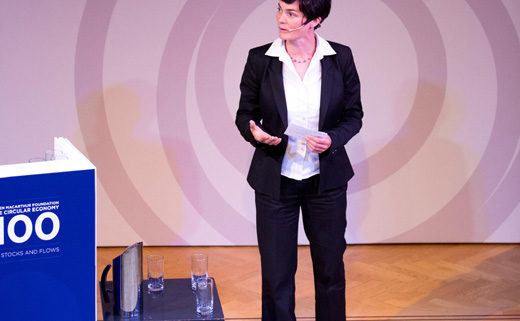CE100 Annual Summit: making the circular economy a reality
The inaugural Circular Economy 100 (CE100) Annual Summit took place this summer, on 19th June 2013. Founded by the Ellen MacArthur Foundation, the CE100 is a global platform uniting leading companies and innovators to accelerate the transition to a circular economy over 1,000 days. It seeks to help businesses unlock the commercial opportunities presented by the circular economy, which, its Circular Economy Reports suggest, could present companies with a trillion dollar cost savings in net energy and material use annually.
The CE100 seeks a collaborative approach to tackling the inherent challenges of moving from a linear model of production and consumption to a more regenerative ‘circular’ model. Its three main goals are to create a mechanism for collective problem solving, build a library of best practice guidance for businesses and help companies add scale to circular economy capabilities within their organisations. More than 30 companies are confirmed as CE100 members to date, including Unilever, Coca-Cola, H&M, Marks & Spencer and Vestas.
Uniting circular economy thinkers
The CE100 Annual Summit attracted a host of revered circular economy thinkers and business leaders, including Google’s Executive Chairman Eric Schmidt, ‘cradle-to-cradle’ pioneers Dr Michael Braungart and William McDonough, Renault, Cisco and B&Q. Our own Mike Biddle also attended, playing a vocal part in the conversation, and was a guest speaker in the Leading Company Cases session. The day began with an overview of the aims and achievements of the Ellen MacArthur Foundation by CEO, Jamie Butterworth, followed by four discussion sessions. Schmidt delivered a compelling evening lecture on how to ‘change the rules of the game’.
Setting the scene, Jeremy Oppenheim of McKinsey & Co. explained that the middles classes of emerging economies such as China and India are growing rapidly, and are expected to place a significant strain on the world’s resources. There may be 475 million middle class inhabitants in India and one billion in China by 2030, estimates Ernst & Young. Business models must change now to positively influence their consumption choices, Oppenheim says.
Professor Walter Stahel, Founder and Director of the Product Life Institute, believes that the change required must take place in the West, and recommends a host of measures to achieve this at a policy level. Meanwhile, Dr Braungart asserts that instead of living in fear of nature, we need to see nature as our partner. He strongly advocates moving away from ‘doing less bad’ and recommends that companies focus on forging a new way forward based on ‘cradle-to-cradle’ thinking.

Changing attitudes
Delegates heard that Generation X may be adopting different consumption patterns, with a recent study in Germany indicating that 75% of 18-24 years olds would prefer to buy a smartphone over a new car, suggesting a preference for access over ownership.
Rethinking design
Janine Benyus, founder of the Biomimicry Institute, argued that we should increasingly look to nature for design inspiration, and recommended the www.asknature.org website as a good place to start. Additionally, designers and business managers should work collaboratively to design within circular networks and understand quantitative metrics to help set priorities, says Jeremy Faludi, a Sustainable Design Strategist.
Best practice examples
With the help of the Ellen MacArthur Foundation, Renault actively pursued a number of circular economy techniques to produce four electric car models, as well as create both remanufacture and repair and battery leasing schemes.
James Walker, Head of Innovation at B&Q, explained that B&Q is working on the idea of a Project Box, a tool box that contains everything consumers might need on a daily basis, except tools needed less frequently such as power drills or ladders – these would be available for rent.
Dutch company Turntoo has furnished an entire school through renting furniture and fixtures rather than selling them outright. Items are rented for a ten-year period, during which time they can be repaired, allowing the school to enjoy better quality items without the initial high outlay. Turntoo can extend the rental ad infinitum, or upgrade, thereby extending the product’s life.
Delegates also learnt that the food supply chain is a great renewable source of molecular value. Some 60% of orange peel waste can be used as the basis of materials such as bio oil and starch. US company Ecovative is using organic waste (including mushrooms) as a raw material to manufacture a new polymer used to make packaging material.
Finally, Neil Harris, Head of Sustainable Business EMEA, Cisco, believes that technology is a key enabler for the circular economy, particularly as cloud platforms allow us to manage systems in a central location.
Looking to the future
“The summit was optimistic in its outlook,” says Mike Biddle, Founder, MBA Polymers. “We heard from a variety of inspiring speakers, representing businesses of all shapes and sizes, and it was clear that the drive for resource efficiency is creating some very exciting new product designs and business models. Adding scale to these ventures and creating an open-sourced framework for implementing circular economy thinking within all businesses will be vital to achieving a true circular economy.”
» CE100 Lecture Video – Carlos Tavares, COO of Renault, explains why the circular economy is relevant to Renault and the wider significance of the framework in the global economy.

